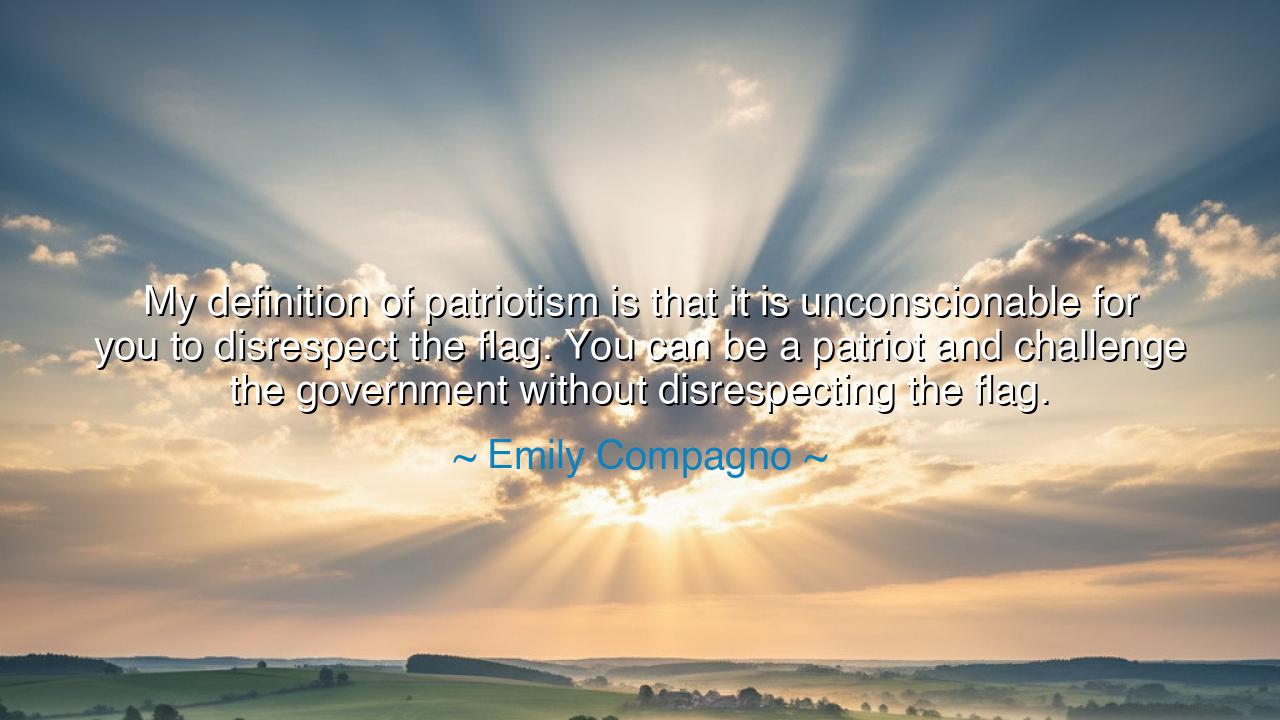
My definition of patriotism is that it is unconscionable for you
My definition of patriotism is that it is unconscionable for you to disrespect the flag. You can be a patriot and challenge the government without disrespecting the flag.






The words of Emily Compagno—“My definition of patriotism is that it is unconscionable for you to disrespect the flag. You can be a patriot and challenge the government without disrespecting the flag.”—rise with the solemnity of an oath. She calls us to recognize the distinction between government and nation, between leaders who pass away and the flag that endures. For the flag is not cloth alone, but the symbol of sacrifice, the emblem of unity, the banner under which generations have fought, labored, and dreamed. To dishonor it, Compagno declares, is to dishonor the countless lives bound up in its folds.
Her teaching reminds us that patriotism is not blind allegiance. It does not mean silence in the face of injustice, nor does it demand unquestioning obedience to rulers. Indeed, Compagno affirms that one may challenge the government—for governments are made of fallible men and women, prone to error, pride, and corruption. Yet the flag represents something higher: the enduring spirit of the people, the ideals etched into a nation’s founding, the sacrifices of soldiers and citizens who gave their lives so that others might live in freedom. Thus, in her words, protest may be righteous, but contempt for the symbol of unity is unconscionable.
History offers us a vivid example. During the Vietnam War, thousands of Americans raised their voices against the conflict. They marched, they petitioned, they demanded change from their leaders. Yet many of those same protesters still carried the flag, not to glorify the government, but to reclaim its meaning. They cried out that their dissent was itself a form of patriotism, that their protests sought to bring America closer to the ideals that the flag proclaimed—justice, liberty, and equality. They challenged their leaders, but they revered the symbol of the people. Here we see Compagno’s truth: love of country is consistent with resistance, but not with desecration.
The ancients, too, understood this wisdom. Among the Romans, the standards carried by legions were treated with the highest reverence. They were not the property of emperors or generals, but of the soldiers themselves, who would sooner die than let their banners be taken by the enemy. To lose a standard was shame; to preserve it was honor. In the same way, Compagno reminds us that the flag belongs not to rulers but to the people, and to treat it with disrespect is to wound the memory of those who bore it through fire and blood.
Yet her words carry also a warning. For some mistake patriotism as silent obedience to authority, forgetting that love of country sometimes demands the courage to resist unjust policies. The flag must never become a tool to silence dissent. Rather, it should stand as a shield that protects the right to speak, to challenge, to demand better. Compagno calls us to balance: honor the symbol, but never surrender the right to question those who govern beneath it.
The lesson for us, then, is both practical and profound. Let us challenge leaders when they falter, speak truth when governments fail, and resist injustice wherever it arises. But let us do so while honoring the flag, remembering that it is not the possession of politicians but the sacred trust of the people. In revering it, we honor the fallen, the laborers, the dreamers, and the generations yet unborn who look to its colors for hope.
In our daily lives, this means teaching our children to see the flag not as an ornament, but as a living symbol of sacrifice. It means dissenting with dignity, protesting with purpose, and speaking with respect even when we oppose. It means remembering that patriotism is not silence, but it is never contempt. By practicing this balance, we prove that love of country is greater than politics, deeper than division, and strong enough to endure.
Thus let Compagno’s words echo in our hearts: challenge the government, if conscience demands it, but never disrespect the flag. For in its folds lies the memory of the nation, the blood of its heroes, and the promise of its future. To honor it while striving for justice is the highest calling of the patriot.






AAdministratorAdministrator
Welcome, honored guests. Please leave a comment, we will respond soon